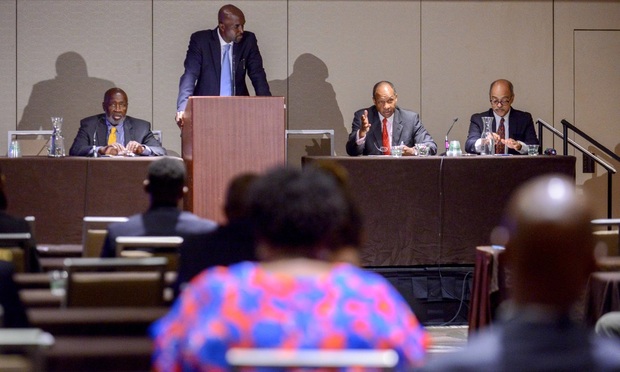Want More Minority Judges? Politicking Matters, NY Judges Say
U.S. District Judges Sterling Johnson Jr. and George B. Daniels stressed the importance of putting solid potential jurists on the radar of senators and others who wield influence in judicial selection.
July 23, 2019 at 06:30 PM
5 minute read
 Xavier Donaldson, of Donaldson & Chilliest, second from left, moderates a panel discussion with, left to right, U.S. District Judges Sterling Johnson Jr. and George Daniels and Magistrate Judge Ramon Reyes during the National Bar Association's 94th Annual Convention in New York City on Tuesday. Photo by David Handschuh/NYLJ
Xavier Donaldson, of Donaldson & Chilliest, second from left, moderates a panel discussion with, left to right, U.S. District Judges Sterling Johnson Jr. and George Daniels and Magistrate Judge Ramon Reyes during the National Bar Association's 94th Annual Convention in New York City on Tuesday. Photo by David Handschuh/NYLJ
Two prominent judges of color said Tuesday that sustained pressure and savvy politicking are needed to address the shortage of racial and ethnic minorities on the bench.
Speaking at the annual conference of the National Bar Association in Midtown Manhattan, U.S. District Judges Sterling Johnson Jr. of the Eastern District of New York and George B. Daniels of the Southern District of New York stressed the importance of putting solid potential jurists on the radar of senators and other people who wield influence in the selection of federal and state judges.
Johnson, who served for more than a decade as the special narcotics prosecutor for New York City before being appointed to the federal bench by President George H.W. Bush, described how he brought pressure to bear. He described for the dozens of black lawyers in the audience how he once met with Sen. Charles Schumer, D-New York, about the historical lack of Democrat-appointed judges in his district.
“He said, 'get me a list,'” Johnson said. “I got him a list, and some of the people on that list are judges today.”
Daniels, who served as a New York state judge before being appointed to the federal bench, said it was important to bend the ear of influential people—even if it meant expressing one's own interest in judicial service. “The public has to demand that the judiciary reflects the rest of the country,” he said.
U.S. Magistrate Judge Ramon Reyes struck a different note from his colleagues. He said one path to the federal bench was by becoming a magistrate judge, which involves a merit-based selection process. But Daniels said politics—a more personal, less party-driven variety—still plays a role in those positions. “You're still going to have to impress people,” he said.
“Everything, there's politics in it,” he said. “'Who do I know, who do I respect, who do I like, who did I work with'—those things play a part. We're human beings, they have to play a part.”
The judges took questions on a variety of topics, such as whether oral argument can affect the outcome of a motion (it can, they agreed, but requires a foundation of good briefing); the merits of mediation; how lawyers should approach settlement conferences; and discretion in sentencing.
Johnson was vocal on the issue of sentencing, noting that crimes involving powdered cocaine have long been treated differently than those involving crack cocaine, which has resulted in harsh sentences for black defendants. He contrasted the sentencing of crack-cocaine defendants with the treatment of Jeffrey Epstein, who was reportedly allowed to leave jail for six days a week and was treated gently by Florida authorities even though an investigation had reportedly implicated him in dozens of sex crimes.
One audience member asked whether it was appropriate to “nudge” judges to rule on a motion. The question was fielded by Daniels, who was called the “king of delayed decisions” by The New York Times in 2004 because of the number of motions that had been briefed for more than six months with no ruling. The latest analysis of federal court records indicates that not a single one of Daniels' civil motions has been pending that long, however.
“There are genuinely times when cases fall through the cracks,” said Daniels, in response to the question. “A polite nudge might help sometimes. … You've got to be very selective.”
Xavier Donaldson, of Donaldson & Chilliest, moderated the event for the National Bar Association, the nation's oldest and largest national network of predominantly African American attorneys and judges. Donaldson kicked off the event by asking the judges a few questions in a “lightning round” Q&A:
Q: Favorite book?
Reyes: “No question, 'The Hobbit.'”
Daniels: “One of my favorites is a biography of Thurgood Marshall.”
Johnson: “My favorite authors are David Ignatius, John Grisham, Tom Clancy.”
Q: Knicks or Mets?
Reyes: “I'm a lifelong Knicks fan.”
Daniels: “I'm a fair-weather fan.”
Johnson: “I'm a Knicks fan.”
Q: Jets or Giants?
Reyes: “Despite the fact that I come from a family of Giants fans … Jets.”
Daniels: “A little preference for the Giants.”
Johnson: “I'm a Giants fan. True blue.”
Q: Will you be watching Mueller's congressional testimony?
Reyes: “I'll probably have it on in the background, but won't pay too much attention to it because I've got a day job.”
Johnson: “I'm absolutely going to watch it, because President Trump said he's not going to watch it, but he's going to watch it. … Hope I'm not disappointed, either.”
This content has been archived. It is available through our partners, LexisNexis® and Bloomberg Law.
To view this content, please continue to their sites.
Not a Lexis Subscriber?
Subscribe Now
Not a Bloomberg Law Subscriber?
Subscribe Now
NOT FOR REPRINT
© 2025 ALM Global, LLC, All Rights Reserved. Request academic re-use from www.copyright.com. All other uses, submit a request to [email protected]. For more information visit Asset & Logo Licensing.
You Might Like
View All

Courts Beginning to Set Standards for Evidence Relying Upon Artificial Intelligence
4 minute read
NY Judge Admonished Over Contributions to Progressive Political Causes

Attorneys ‘On the ‘Move: Morrison Cohen Expands White Collar Practice; O’Melveny Brings Back Corporate Finance Partner
6 minute readTrending Stories
- 1'It's Not Going to Be Pretty': PayPal, Capital One Face Novel Class Actions Over 'Poaching' Commissions Owed Influencers
- 211th Circuit Rejects Trump's Emergency Request as DOJ Prepares to Release Special Counsel's Final Report
- 3Supreme Court Takes Up Challenge to ACA Task Force
- 4'Tragedy of Unspeakable Proportions:' Could Edison, DWP, Face Lawsuits Over LA Wildfires?
- 5Meta Pulls Plug on DEI Programs
Who Got The Work
Michael G. Bongiorno, Andrew Scott Dulberg and Elizabeth E. Driscoll from Wilmer Cutler Pickering Hale and Dorr have stepped in to represent Symbotic Inc., an A.I.-enabled technology platform that focuses on increasing supply chain efficiency, and other defendants in a pending shareholder derivative lawsuit. The case, filed Oct. 2 in Massachusetts District Court by the Brown Law Firm on behalf of Stephen Austen, accuses certain officers and directors of misleading investors in regard to Symbotic's potential for margin growth by failing to disclose that the company was not equipped to timely deploy its systems or manage expenses through project delays. The case, assigned to U.S. District Judge Nathaniel M. Gorton, is 1:24-cv-12522, Austen v. Cohen et al.
Who Got The Work
Edmund Polubinski and Marie Killmond of Davis Polk & Wardwell have entered appearances for data platform software development company MongoDB and other defendants in a pending shareholder derivative lawsuit. The action, filed Oct. 7 in New York Southern District Court by the Brown Law Firm, accuses the company's directors and/or officers of falsely expressing confidence in the company’s restructuring of its sales incentive plan and downplaying the severity of decreases in its upfront commitments. The case is 1:24-cv-07594, Roy v. Ittycheria et al.
Who Got The Work
Amy O. Bruchs and Kurt F. Ellison of Michael Best & Friedrich have entered appearances for Epic Systems Corp. in a pending employment discrimination lawsuit. The suit was filed Sept. 7 in Wisconsin Western District Court by Levine Eisberner LLC and Siri & Glimstad on behalf of a project manager who claims that he was wrongfully terminated after applying for a religious exemption to the defendant's COVID-19 vaccine mandate. The case, assigned to U.S. Magistrate Judge Anita Marie Boor, is 3:24-cv-00630, Secker, Nathan v. Epic Systems Corporation.
Who Got The Work
David X. Sullivan, Thomas J. Finn and Gregory A. Hall from McCarter & English have entered appearances for Sunrun Installation Services in a pending civil rights lawsuit. The complaint was filed Sept. 4 in Connecticut District Court by attorney Robert M. Berke on behalf of former employee George Edward Steins, who was arrested and charged with employing an unregistered home improvement salesperson. The complaint alleges that had Sunrun informed the Connecticut Department of Consumer Protection that the plaintiff's employment had ended in 2017 and that he no longer held Sunrun's home improvement contractor license, he would not have been hit with charges, which were dismissed in May 2024. The case, assigned to U.S. District Judge Jeffrey A. Meyer, is 3:24-cv-01423, Steins v. Sunrun, Inc. et al.
Who Got The Work
Greenberg Traurig shareholder Joshua L. Raskin has entered an appearance for boohoo.com UK Ltd. in a pending patent infringement lawsuit. The suit, filed Sept. 3 in Texas Eastern District Court by Rozier Hardt McDonough on behalf of Alto Dynamics, asserts five patents related to an online shopping platform. The case, assigned to U.S. District Judge Rodney Gilstrap, is 2:24-cv-00719, Alto Dynamics, LLC v. boohoo.com UK Limited.
Featured Firms
Law Offices of Gary Martin Hays & Associates, P.C.
(470) 294-1674
Law Offices of Mark E. Salomone
(857) 444-6468
Smith & Hassler
(713) 739-1250






